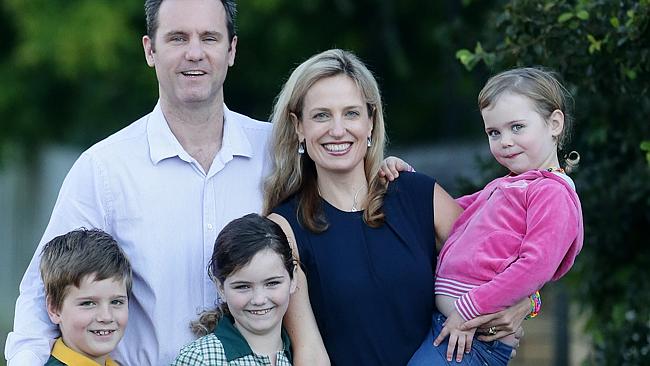
Neurosurgeon Sarah Olson with her family, husband Brad Armstrong and children Ingrid (8), Sam (7) and Charlotte (4). Sarah has been nominated for a Pride of Australia Medal. Pic Peter Wallis Source: News Corp Australia
BRISBANE neurosurgeon Sarah Olson said she reached a point in her career when she realised that no matter how good she was at her job, she wouldn’t be able to save all of her patients.
Research was what was needed, she knew, to stop people from developing brain tumours and ending up on her operating table.
“The only people who can cure this are the researchers, even if I am the world’s most brilliant neurosurgeon I can’t cure it — so I need to help the research team,’’ Dr Olson, 42, said.
“Breast and prostate cancer have had incredible improvements in survival because of research, but brain tumours have received the least in funding for research — despite being the biggest killer in people under 40.’’
For her work in helping to find a cure by establishing a brain tumour bank with the John Trivett Foundation, Dr Olson from the Princess Alexandra Hospital has been nominated for a Pride of Australia Care and Compassion Medal.
In nominating Dr Olson, Metro South Health commended her selflessness, saying she had offered to pay the maintenance of the tumour bank from her own money if enough funds could not be raised, and had chosen to forego gap payments in lieu of patients donating the money to research.
“I realised that every time a brain tumour goes in the bin, it should be going to people who should be making a difference,’’ she said.
“We managed to get all neurosurgeons on board in Queensland, we found a place and we secured ongoing funding.’’
The mother-of-three said while her job was extremely rewarding, it could also be emotionally challenging, with the five-year survival rates for glioblastoma brain tumours only 10 per cent.
“Some things are really emotionally hard going, I have been on the floor with my head in my hands wondering if this patient is going to be alright,’’ she said.
“Brain tumours are particularly horrible; I hate what they do to people and their families.
“But sometimes I think we see things that usually only priests see — we see people at their worst and families in their most difficult situations, and I am always amazed how they stand up to it, people are incredibly resilient in these situations.’’
